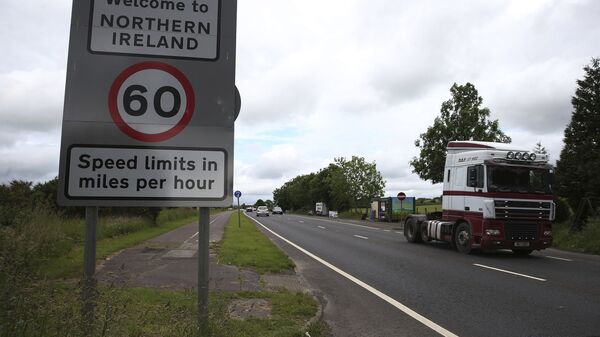The clock is ticking for the UK's Brexit talks, which must be agreed to by the end of March, when the nation is slated to leave the EU. "Cracks" are starting to emerge in Brussels' pledge that there will be no hard border between the Republic of Ireland and Northern Ireland, AFP news agency reports, referring to "an increasingly frail" draft UK-EU deal.
Adding fuel to the fire was the European Commission's chief spokesman Margaritis Schinas who suggested earlier this week that in the event of a no-Brexit deal scenario in Ireland, "[…] it's pretty obvious, you will have a hard border".
READ MORE: Irish Party Slams EU for Using Border Issue 'As Weapon' to Sabotage Brexit
The Irish Independent described the remarks as a "Brexit backstab", which the newspaper claimed were aimed at making Dublin brace itself for "some difficult discussions in the weeks ahead".
Irish Prime Minister Leo Varadkar, for his part, warned that a no-deal may result in a "period of chaos" and that the EU, the UK and Dublin would finally have to "agree on full alignment" between Northern Ireland and the Republic of Ireland in order to avoid a hard border.
Touching upon checks on the border, Varadkar suggested that these could "involve people in uniform" as well as "cameras, physical infrastructure, possibly a police presence, or an army presence to back it up".
READ MORE: EU Should Not Use Irish Border to 'Blackmail' UK in Brexit Talks — Irish MP
EU chief negotiator Michel Barnier, in turn, urged the sides to find "an operational way of carrying out checks and controls without putting a border back in place".
In this vein, AFP cited Federico Fabbrini, director of Dublin City University's Brexit Institute, as saying the Irish government's stance on the matter position is "reasonable".
"It doesn't want to take action on the border for as long as re-imposing a border is avoidable," he pointed out.
READ MORE: UK Politician: Britons Are Not Bothered About Possible Hard Border With Ireland
The issue remains an obstacle on the agenda of the current Brexit talks as London's exit from the EU might create difficulties for the free movement of goods and workers between the Republic of Ireland and Northern Ireland.
The withdrawal may also lead to a return of a hard border between the sides in potential violation of the 1998 Good Friday Agreement which specifically stipulates that no physical border should exist between the Republic of Ireland and Northern Ireland.



